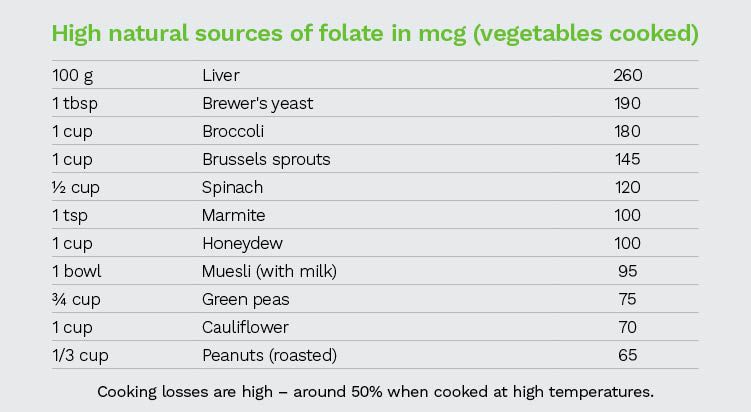I can’t stress enough how important this yellow vitamin is to our health and deficencies are common. Lack of folate is strongly linked to: . Alzheimer's, dementia symptoms, age-related hearing loss, cognitive decline and macular degeneration. High homocysteine levels lead to: . Stroke, heart disorders, multiple sclerosis and rheumatoid arthritis. . Colon cancer, irritable bowel syndrome (IBS) and low energy. . Cold hands and feet, restless legs and gout. Deficiencies during pregnancy: Toxemia, premature birth, miscarriage, spina bifida, cleft palate and post-natal depression. . Hot flushes during menopauntal health conditions. Folate needs to come from our diet Good gut bacteria can support the production of folate, but mostly it comes from our diet, or a folic acid supplement. Folate is known to be drained from our body by excess alcohol, smoking, aspirin and the oral contraceptive pill. Folate supplied in supplements or food additives is in folic acid form. Folic acid is far more stable than natural folate which deteriorates quickly. It does however require conversion by our liver into folate. This appears to occur without difficulty, unless we’re lacking vitamins B6 and B12. Folate protects our cognitive function and memory as we age Folate is similar in action to vitamin B12, and both are important for our brain health. Low levels are commonly found in those suffering from Alzheimer's, dementia, depression and psychiatric disorders. A three-year Netherlands study, reporting in ‘The Lancet’ medical journal, found that those taking a folic acid supplement had significantly better memory, reaction time, mental processing speed and word fluency than the control group. The researchers reported: “Folic acid supplementation for three years, significantly improved domains of cognitive function that tend to decline with age.” Folate reduces high homocysteine levels Homocysteine is an amino acid which when elevated, increases our risk of stroke, heart attack, cognitive decline, macular degeneration, multiple sclerosis, rheumatoid arthritis and Alzheimer's. Folate helps prevent this elevation. A group of Australian scientists recently examined 36 healthy people and measured their brains. They found that the older people with high amounts of homocysteine had decreased sized brains. Colon cancer reduced 75% and Alzheimer’s 55% A ten-year ‘Nurses’ Health Study’, found that adequate folate reduced the incidence of colon cancer by a massive 75%. Also, a nine-year study by ‘Baltimore Longitudinal Study of Aging’ found that 400 mcg of folic acid daily lowered the risk of Alzheimer’s by 55%. Folate reduces birth defects Folate is required by our DNA to control cell division. Lack of folate during pregnancy can result in spina bifida, toxemia, miscarriage, mental impairment and other malformities of children. During pregnancy the need for folate doubles. NZ doctors recommend that women take 800 mcg of folic acid daily for at least a month before trying to conceive, and for at least 12 weeks during breast feeding. One recent US study found 86% of childbearing age women were in the folate ‘danger zone’ for pregnancy defects. NZ could be worse, as American white flour is required by law to be fortified with folic acid. The New Zealand Labour government announced that from mid-2023, white flour used for bread making in NZ must be fortified with folic acid. Testing your folate level A Folate Red Cell blood test can measure your folate levels. Low folate is defined in the test as below 317 nmol/L. The optimum range is 906 to 1400 nmol/L.

Recommended Daily Intake (RDI) Men and Women: 400 mcg, Pregnancy: 600 mcg, Breastfeeding: 500 mcg. Supplements in NZ are limited to 300mcg of folic acid.
About the Author

David Coory - Founder of Health House. Author
of Stay Healthy by supplying what’s
lacking in your diet, New Zealand's
top selling health book.